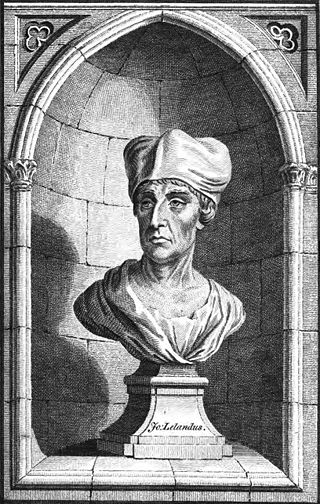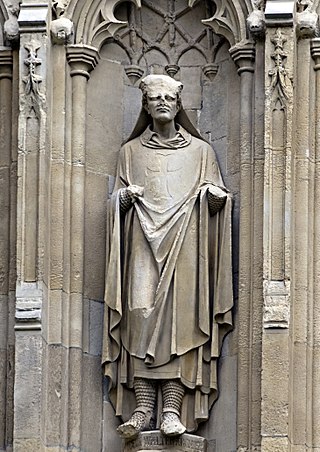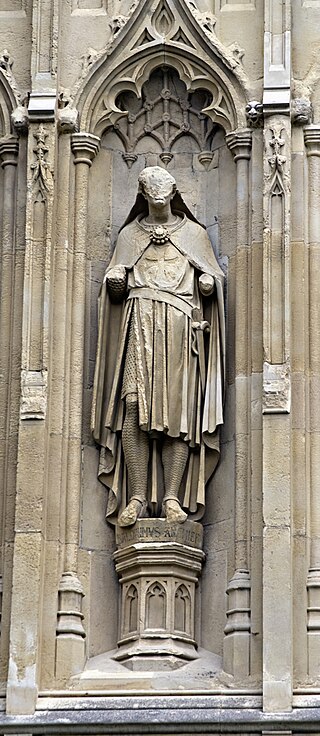Bibliography
- Camden, William Remains Concerning Britain (London, 1657) pp. 309–310.
- Mortimer, Richard Angevin England 1154–1258 Oxford: Blackwell 1994 ISBN 0-631-16388-3
Antiocheis is an epic poem by Joseph of Exeter, written in Latin soon after the year 1190, when Joseph returned to England from the Third Crusade on the death of his friend and fellow Crusader, Baldwin of Exeter, archbishop of Canterbury. [1]
The poem is lost, except for a single fragment of 21 lines quoted by William Camden in his miscellany Remains Concerning Britain . The fragment praises Britain as a land of warriors, giving King Arthur as an example.
Old English literature refers to poetry and prose written in Old English in early medieval England, from the 7th century to the decades after the Norman Conquest of 1066, a period often termed Anglo-Saxon England. The 7th-century work Cædmon's Hymn is often considered as the oldest surviving poem in English, as it appears in an 8th-century copy of Bede's text, the Ecclesiastical History of the English People. Poetry written in the mid 12th century represents some of the latest post-Norman examples of Old English. Adherence to the grammatical rules of Old English is largely inconsistent in 12th-century work, and by the 13th century the grammar and syntax of Old English had almost completely deteriorated, giving way to the much larger Middle English corpus of literature.

Richard I, known as Richard Cœur de Lion or Richard the Lionheart because of his reputation as a great military leader and warrior, was King of England from 1189 until his death in 1199. He also ruled as Duke of Normandy, Aquitaine, and Gascony; Lord of Cyprus; Count of Poitiers, Anjou, Maine, and Nantes; and was overlord of Brittany at various times during the same period. He was the third of five sons of Henry II of England and Eleanor of Aquitaine and was therefore not expected to become king, but his two elder brothers predeceased their father.

William Camden was an English antiquarian, historian, topographer, and herald, best known as author of Britannia, the first chorographical survey of the islands of Great Britain and Ireland, and the Annales, the first detailed historical account of the reign of Elizabeth I of England.

John Leland or Leyland was an English poet and antiquary.

Hubert Walter was an influential royal adviser in the late twelfth and early thirteenth centuries in the positions of Chief Justiciar of England, Archbishop of Canterbury, and Lord Chancellor. As chancellor, Walter began the keeping of the Charter Roll, a record of all charters issued by the chancery. Walter was not noted for his holiness in life or learning, but historians have judged him one of the most outstanding government ministers in English history.

In the civil service of the United Kingdom, His Majesty's Exchequer, or just the Exchequer, is the accounting process of central government and the government's current account in the Consolidated Fund. The term is used in various financial documents, including the latest departmental and agency annual accounts.

Richard Poore or Poor was a medieval English bishop best known for his role in the establishment of Salisbury Cathedral and the City of Salisbury, moved from the nearby fortress of Old Sarum. He served as Bishop of Chichester, Bishop of Salisbury and Bishop of Durham.

Walter de Coutances was a medieval Anglo-Norman bishop of Lincoln and archbishop of Rouen. He began his royal service in the government of Henry II, serving as a vice-chancellor. He also accumulated a number of ecclesiastical offices, becoming successively canon of Rouen Cathedral, treasurer of Rouen, and archdeacon of Oxford. King Henry sent him on a number of diplomatic missions and finally rewarded him with the bishopric of Lincoln in 1183. He did not remain there long, for he was translated to Rouen in late 1184.

The term Angevin Empire describes the possessions held by the House of Plantagenet during the 12th and 13th centuries, when they ruled over an area covering roughly all of present-day England, half of France, and parts of Ireland and Wales, and had further influence over much of the remaining British Isles. It may be described as an early example of a composite monarchy. The empire was established by Henry II of England, who succeeded his father Geoffrey as Duke of Normandy and Count of Anjou. Henry married Eleanor of Aquitaine in 1152, acquiring the Duchy of Aquitaine, and inherited his mother Empress Matilda's claim to the English throne, succeeding his rival Stephen in 1154. Although their title of highest rank came from the Kingdom of England, the Plantagenets held court primarily on the continent at Angers in Anjou, and at Chinon in Touraine.

The House of Plantagenet was a royal house which originated in the French County of Anjou. The name Plantagenet is used by modern historians to identify four distinct royal houses: the Angevins, who were also Counts of Anjou; the main line of the Plantagenets following the loss of Anjou; and the houses of Lancaster and York, two of the Plantagenets cadet branches. The family held the English throne from 1154, with the accession of Henry II, until 1485, when Richard III died.

Baldwin of Forde or Ford was Archbishop of Canterbury between 1185 and 1190. The son of a clergyman, he studied canon law and theology at Bologna and was tutor to Pope Eugene III's nephew before returning to England to serve successive bishops of Exeter. After becoming a Cistercian monk he was named abbot of his monastery at Forde and subsequently elected to the episcopate at Worcester. Before becoming a bishop, he wrote theological works and sermons, some of which have survived.
Joseph of Exeter was a twelfth-century Latin poet from Exeter, England. Around 1180, he left to study at Gueldres, where he began his lifelong friendship with Guibert, who later became Abbot of Florennes. Some of their correspondence still survives.

Daretis Phrygii Ilias De bello Troiano is an epic poem in Latin, written around 1183 by the English poet Joseph of Exeter. It tells the story of the ten year Trojan War as it was known in medieval western Europe. The ancient Greek epic on the subject, the Iliad, was inaccessible; instead, the sources available included the fictional "diaries" of Dictys of Crete and Dares of Phrygia. When Joseph's text was printed for the first time in 1541, it was actually erroneously attributed to Dares of Phrygia, announced as the long-lost verse version of his story supposedly put into Latin hexameters by Nepos.
Events from the 1320s in England.
Henry Marshal was a medieval Dean of York and Bishop of Exeter. He was a younger son of John Marshal and his wife Sybilla of Salisbury, and thus a younger brother of William Marshal and a member of the Marshal family.
William Briwere was a medieval Bishop of Exeter.
Philip Freeman (1818–1875) was a Church of England cleric and Archdeacon of Exeter.
Ian James Forrester Mortimer is a British historian and writer of historical fiction. He is best known for his book The Time Traveller's Guide to Medieval England, which became a Sunday Times bestseller in paperback in 2010.

The Angevin kings of England were Henry II and his sons, Richard I and John, who ruled England from 1154 to 1216. With ancestral lands in Anjou, they were related to the Norman kings of England through Matilda, the daughter of Henry I, and Henry II's mother. They were also related to the earlier Anglo-Saxon kings of England through Matilda's great-great-great grandfather, Aethelred the Unready. Their descendants, the main line of Plantagenets, continued to rule England until 1485; some historians make no distinction between the Angevins and the Plantagenets, while others name John's son Henry III the first Plantagenet king.